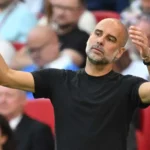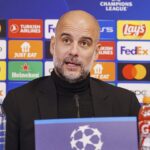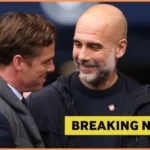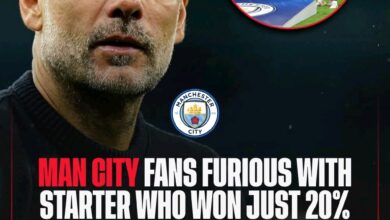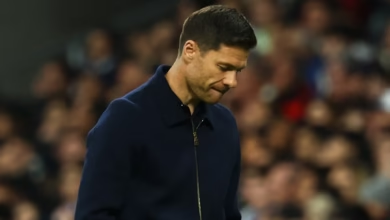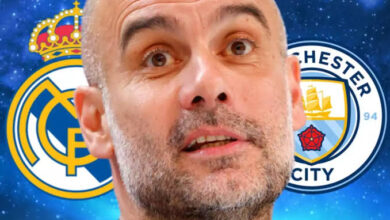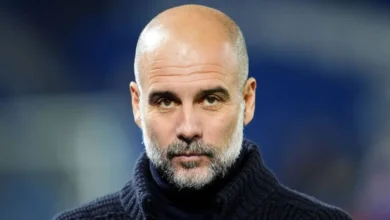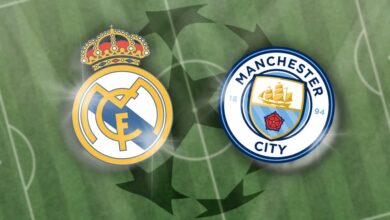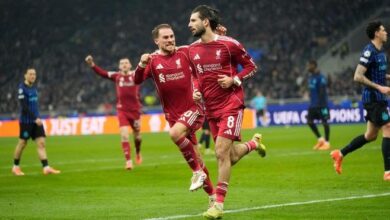One of Manchester City’s senior players has shown that he has a key role to play in City’s rebuild
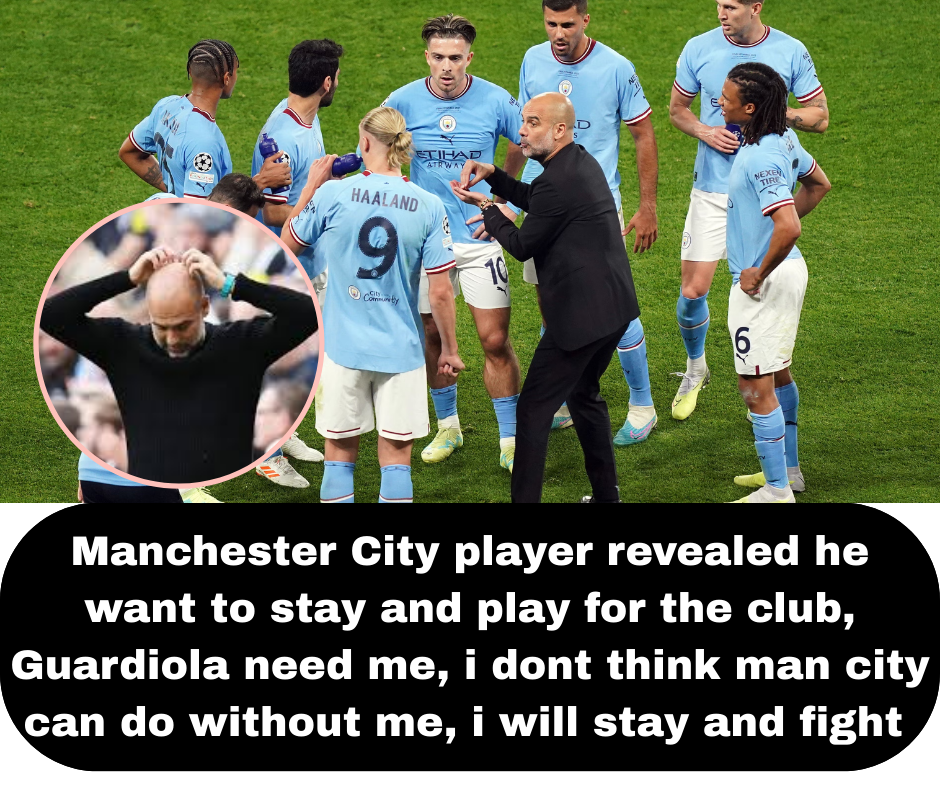
In the twilight of what has been a challenging season by Manchester City’s lofty standards, an understated but entirely essential figure has emerged as the embodiment of the club’s resilience. As speculation swirls about a summer of significant change at the Etihad Stadium, Bernardo Silva’s performances over the past two months have offered a compelling case that, amidst the expected departures and new arrivals, he must remain as a cornerstone of Pep Guardiola’s vision for the future.
The 2024/25 campaign has represented unfamiliar territory for a Manchester City side that had grown accustomed to domestic dominance. Following three consecutive Premier League titles, this season has seen City struggle to maintain their usual supremacy. By mid-February, they sat a concerning fifth in the table, trailing Liverpool by 18 points and facing a genuine battle to secure Champions League qualification.
The causes of this relative decline have been multifaceted. A combination of injuries to key personnel, the aging of certain squad members, and perhaps an inevitable emotional and physical fatigue after years of relentless excellence had taken its toll. For the first time in Guardiola’s tenure, there were whispers that the Catalan maestro’s spell at the club might be approaching its natural conclusion.
Yet as spring has arrived in Manchester, so too has a revival in City’s fortunes. Nine games unbeaten across all competitions have reignited their season. The team has secured an FA Cup final berth against Crystal Palace and, perhaps more crucially, climbed back into third position in the Premier League. With three games remaining, qualification for next season’s revamped Champions League appears increasingly likely.
At the heart of this resurgence has been Bernardo Silva. The Portuguese international’s 400th appearance for Manchester City, which came in Friday night’s critical 1-0 victory over Wolverhampton Wanderers, perfectly encapsulated his value to the team. Operating primarily from a central midfield position but drifting intelligently across the pitch, Bernardo’s performance was a masterclass in spatial awareness, technical security, and tactical intelligence.
Earlier in the season, Bernardo had appeared somewhat diminished. The sparkle and verve that have characterized his seven years at the club seemed dulled, with fatigue apparently catching up with a player who routinely tops the club’s distance-covered statistics. His output had decreased, both in terms of goals and assists, and there were indications that this might finally be the summer where long-standing interest from Barcelona or Paris Saint-Germain materialized into a transfer.
However, as City’s need has grown, so too has Bernardo’s influence. The semi-final victory over Nottingham Forest showcased his ability to elevate his game on the grandest occasions. Operating in a more advanced role, he was instrumental in creating the openings that ultimately secured City’s path to Wembley.
Against Wolves, deployed alongside Rodri in a deeper position, his performance was no less impressive. In the absence of the injured Kevin De Bruyne, Bernardo assumed greater responsibility for City’s creative output. He completed 94% of his passes, created three chances, and completed more successful dribbles (5) than any other player on the pitch. More than the statistics, though, it was his constant availability, his perpetual motion, and his capacity to retain possession under pressure that provided the platform for City’s victo
What makes Bernardo Silva such a precious commodity in modern football is his rare combination of technical excellence and selfless application. In an era where individual branding and statistical prominence often drive player behavior, Bernardo represents an increasingly endangered species: the consummate team player whose first, second, and third priorities are collective success.
Throughout his time at Manchester City, he has been deployed as a right winger, a number ten, a central midfielder, and even occasionally as a false nine or auxiliary left-back. In each role, he has adapted without complaint, understanding that his versatility is an asset rather than a burden. There has never been any suggestion that he considers certain positions beneath his dignity or outside his job description.
This adaptability extends beyond merely positional flexibility. Bernardo modulates his game according to the team’s needs in any given moment. When City require ball retention and control, he becomes a metronomic presence, recycling possession with meticulous care. When transitions are the priority, he transforms into a dynamic carrier, progressing the ball through combination play or direct dribbling. When defensive diligence is paramount, his pressing intensity and tracking back become defining features.
“What I love most about Bernardo,” Guardiola once remarked, “is that he would play equally well for the champions or for a team fighting relegation. His commitment never wavers.”
This comment encapsulates what makes Bernardo so essential to Manchester City’s ethos. In a squad assembled at considerable expense and featuring numerous global superstars, his humility and work ethic provide a template for how Guardiola expects his players to behave. There is no ego, no sense of entitlement, merely a relentless dedication to fulfilling whatever role best serves the collective.
As the season approaches its conclusion, Manchester City find themselves at a pivotal juncture. The summer transfer window promises significant upheaval, with several long-serving players potentially departing. The speculation surrounding Kevin De Bruyne’s future has intensified in recent weeks, with Saudi Arabian clubs reportedly prepared to offer the Belgian midfielder a financial package that would be difficult to refuse. Ederson, a transformative goalkeeper whose distribution has been central to City’s playing style, is another who has been linked with a move to the Saudi Pro League.
Beyond these immediate concerns lies a broader transition. İlkay Gündoğan’s departure last summer was perhaps the first indicator that the core group who have defined City’s golden era are reaching their natural conclusion as a unit. Rodri, though still at his peak, has battled injuries this season. Kyle Walker’s pace remains remarkable, but at 35, his ability to recover will inevitably diminish. Even the talismanic figure of De Bruyne, when available, has shown occasional signs that his physical resilience is not what it once was.
This evolving landscape makes Bernardo Silva’s continued presence all the more valuable. At 30, he remains in his prime years. His game has never been predicated on explosive athleticism that might diminish with age, but rather on technical excellence, positional intelligence, and cardiovascular endurance that should remain largely intact for several seasons to come.
Moreover, in a period of transition, continuity becomes precious. The institutional knowledge that Bernardo carries—his understanding of Guardiola’s principles, his familiarity with the club’s culture, his relationships with teammates—represents an invaluable resource as new players are integrated into the squa
If, as appears likely, Manchester City undergo significant squad renewal this summer, the challenge of integrating new signings will be considerable. Guardiola’s system is notoriously demanding and complex. Players who arrive at the Etihad, regardless of their pedigree or price tag, typically require time to assimilate the positional concepts, pressing triggers, and rotational patterns that underpin City’s approach.
This is where Bernardo Silva’s presence becomes particularly significant. Beyond his on-field contributions, his embodiment of Guardiola’s philosophy makes him the ideal mentor for newcomers. He represents a living example of what it means to be a Manchester City player under this manager: technically impeccable, tactically versatile, physically indefatigable, and psychologically selfless.
Consider the journey of Erling Haaland. The Norwegian striker’s goalscoring prowess has been evident from his first appearance in a City shirt, but his integration into the team’s build-up play and pressing structure has been a more gradual process. Players like Bernardo, with their game intelligence and communicative abilities, have been instrumental in facilitating this adaptation.
Similar challenges await this summer’s arrivals. Whether City target established stars or emerging talents, the acclimatization process will be critical to their success. Having players who can serve as on-field tutors, demonstrating through their actions what Guardiola demands, will accelerate this process considerably.
Leadership within football teams manifests in various forms. There are the vocal organizers, the inspirational figureheads, and then there are those who lead through consistent example. Bernardo Silva belongs primarily to this third category, though his on-field communication has noticeably increased as he has matured at City.
With potential departures looming, particularly if De Bruyne were to leave, the leadership dimension becomes increasingly important. Rodri would likely assume greater responsibility, as would John Stones when fit, but Bernardo’s seniority and standing within the squad position him as a natural deputy.
What makes his leadership particularly valuable is its alignment with Guardiola’s vision. Some leaders within football teams derive their authority from character traits or achievements that exist independently of the manager’s philosophy. Bernardo’s influence, by contrast, stems precisely from his exemplary embodiment of what Guardiola values. He is, in effect, a playing extension of the manager’s principles.
This characteristic makes him an ideal bridge between Guardiola and the squad during a period of transition. New signings will naturally look to established players for guidance on what is expected, and Bernardo’s interpretation of his role provides the perfect template.
Another factor in Bernardo Silva’s continued relevance to Manchester City is his technical evolution. While his fundamental qualities have remained consistent throughout his time at the club, his application of these attributes has developed in response to changing circumstances.
Earlier in his City career, particularly during the 2018/19 season when he was nominated for the PFA Player of the Year award, Bernardo’s game was characterized by his work on the right flank. His close control in tight spaces, combined with surprising physical resilience, made him exceptionally effective in retaining possession under pressure and creating overloads with Kyle Walker and Raheem Sterling.
As his role has become more central, both literally and figuratively, different aspects of his technical repertoire have come to the fore. His appreciation of space, his ability to receive on the half-turn, and his range of passing have all developed significantly. Where once he might have been categorized primarily as a dribbler and combinative player, he now regularly demonstrates the capacity to dictate tempo and control matches through his distribution.
This evolution suggests a player who continues to add dimensions to his game, rather than one whose development has plateaued. Given Manchester City’s need to evolve tactically as opponents become increasingly familiar with their patterns, Bernardo’s adaptability represents a precious asset.
Football at the elite level is inevitably a business as well as a sport. Any decision regarding Bernardo Silva’s future will factor in financial considerations alongside sporting ones. With two years remaining on his contract after this season, the summer of 2025 represents the point at which his transfer value will begin to depreciate significantly if no extension is agreed.
However, the economics of potential replacement must also be considered. In the current market, acquiring a player of comparable quality, versatility, and tactical understanding would likely cost substantially more than whatever fee Bernardo might command. Moreover, there would be no guarantee that any replacement would adapt successfully to Guardiola’s demands or the Premier League’s intensity.
The cost-benefit analysis extends beyond the transfer fee and wages. The risk associated with any replacement—the possibility that they might fail to settle or perform—carries its own economic implications. In a season where Champions League qualification has been in jeopardy, the financial consequences of such a risk materializing would be considerable.
From this perspective, retaining Bernardo, even if it means offering an extended contract to a player entering his thirties, may represent the more prudent economic decision as well as the obvious sporting one
Manchester City’s youth development has advanced significantly in recent years. The emergence of players like Rico Lewis and Oscar Bobb suggests that the club’s investment in its academy is beginning to yield dividends at the first-team level. The recent opportunities afforded to Nico O’Reilly, albeit in limited minutes, indicate that Guardiola is increasingly willing to integrate young talent when appropriate.
This generational shift within the squad further emphasizes the value of retaining figures like Bernardo Silva. The transition from academy football to the senior environment is challenging for any young player, regardless of talent. Having role models who exemplify the standards and behaviors required at the elite level can significantly enhance a prospect’s development.
In this context, Bernardo’s professionalism and application provide the perfect example for emerging talents. His technical excellence demonstrates what is required, while his attitude illustrates how those abilities should be applied. For young midfielders in particular, there could be no better mentor to observe daily in training and matches.
As Manchester City approach the final three matches of their Premier League campaign, the immediate priority remains securing Champions League qualification. The financial implications of failing to do so would be severe, potentially constraining the club’s maneuverability in the transfer market and complicating their ability to attract elite talent.
Beyond this season lies a summer of important decisions. The anticipated rebuild will require careful management to ensure that City remain competitive while transitioning to a new era. Key positions will need reinforcing, and the balance between experience and youth will need recalibrating.
Amidst these deliberations, Bernardo Silva’s value to the project appears increasingly self-evident. His performances during City’s recent resurgence have demonstrated that he remains an elite midfielder capable of influencing the highest-level matches. His versatility provides Guardiola with tactical flexibility at a time when squad depth may be temporarily reduced. His professionalism and understanding of City’s methodology make him the ideal senior figure to help assimilate new arrivals.
Most fundamentally, though, it is Bernardo’s absolute commitment to the collective that makes him such a perfect fit for Guardiola’s vision. In a sporting environment increasingly dominated by individual branding and statistical recognition, his willingness to subordinate personal glory to team success represents a precious commodity.
As one City supporter recently observed on social media: “Players like Bernardo Silva don’t just help you win trophies; they help you build a culture where winning becomes habitual.”
For a Manchester City team preparing to enter a new phase of its development, that culture will be as important as any tactical system or individual signing. Bernardo Silva may not always command the headlines or feature in the season’s most spectacular moments, but his influence runs deeper than such superficial measures suggest.
In the architecture of Manchester City’s next iteration, he deserves to be a foundational element rather than a sacrificial component. As Pep Guardiola and the club’s hierarchy plan their summer strategy, ensuring Bernardo Silva’s continued presence at the Etihad should be among their highest priorities. In the Portuguese midfielder, they possess not merely an excellent footballer, but an embodiment of the values and approach that have defined their most successful era.

